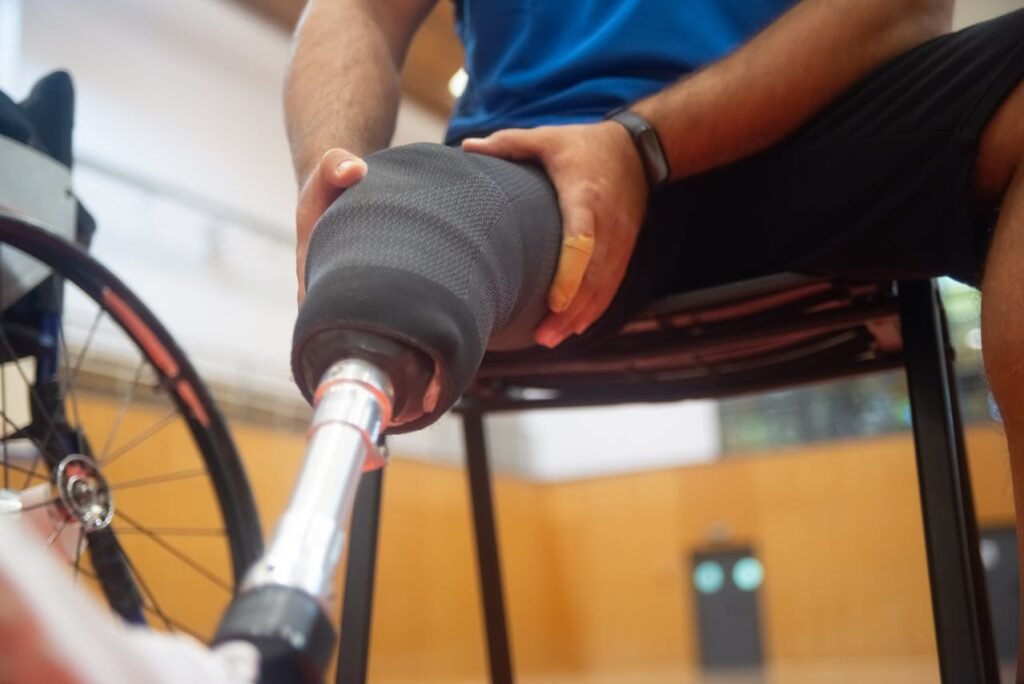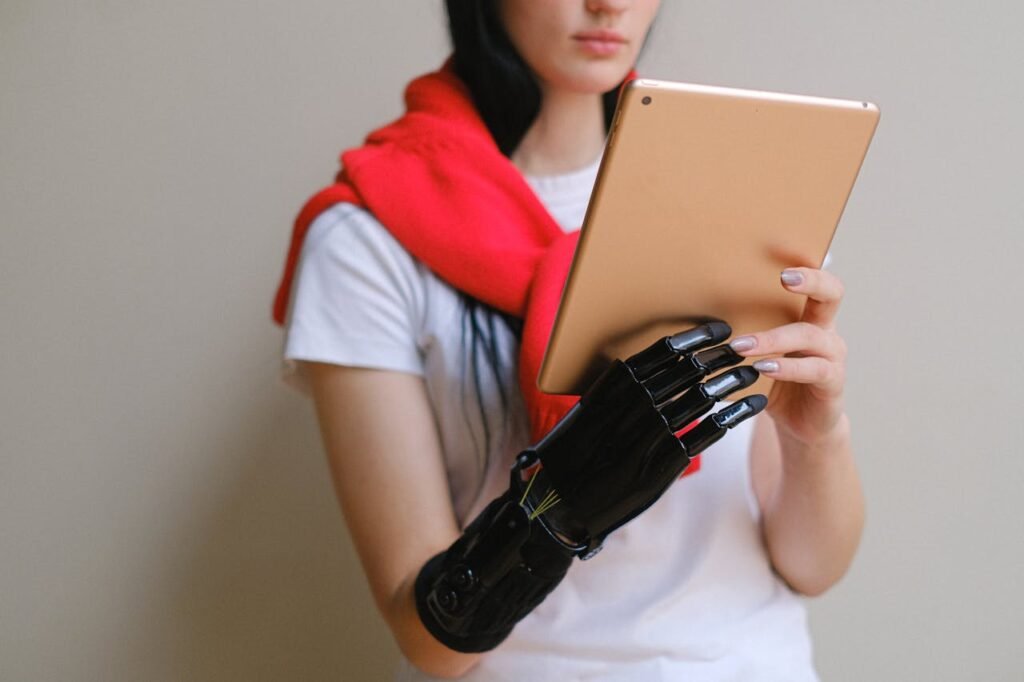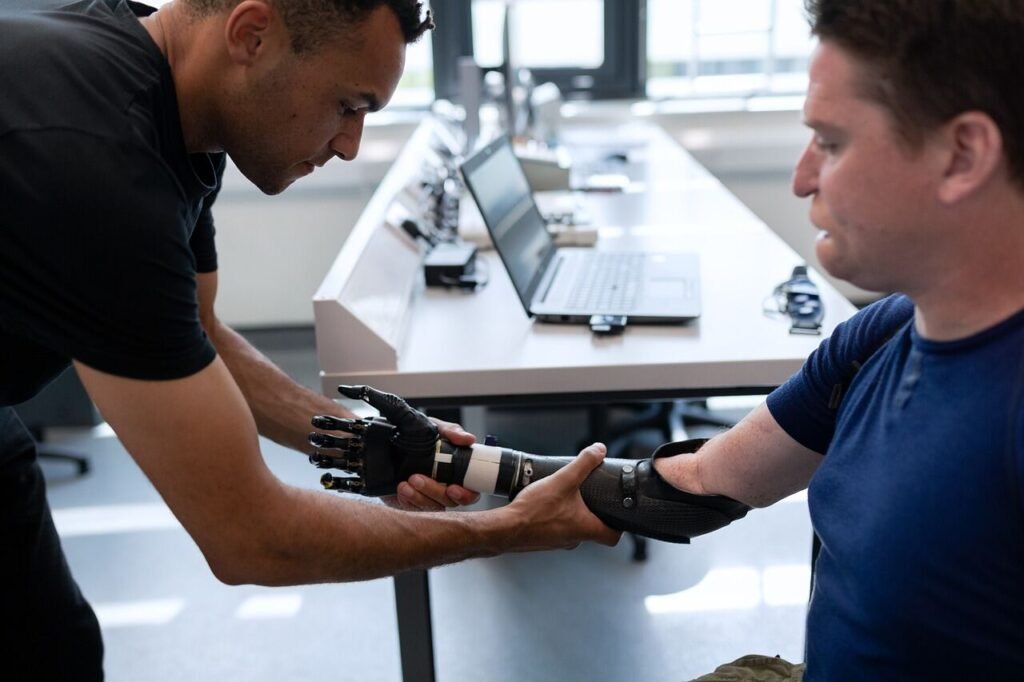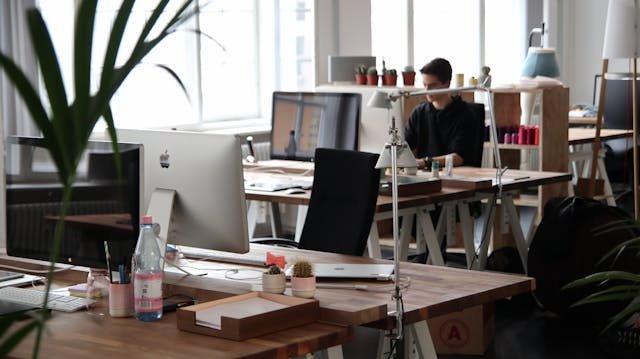Work is more than just a way to earn. For many, it is pride, identity, and independence. But for someone with a limb difference, the workplace can feel full of challenges.
From handling tools in a factory to lifting goods in a warehouse, from typing in an office to managing machines, every task demands strength and precision. This is where prosthetics built for industrial grips play a life-changing role.
India is home to many hardworking men and women in industries that depend on skilled hands. Cities like Pune, Chennai, Bengaluru, and Ahmedabad are buzzing with factories, workshops, and offices that need safe, strong, and reliable workers. With the right prosthetic, these workers can do their jobs with confidence, without feeling limited by their limb loss.
At RoboBionics, we have seen firsthand how advanced prosthetic hands like Grippy™ open doors for people. They help someone pick up a hammer, hold a screwdriver, or carry a heavy part safely. They give back not just ability, but dignity.
This guide will take you through the role of workplace-focused prosthetics, why industrial grips matter, and which Indian cities offer the best opportunities for people ready to re-enter the workforce with strength and confidence.
Why Industrial Grips Matter at Work
The Difference Between Daily Use and Workplace Use

A prosthetic made for daily life helps with everyday activities like holding a cup, using a phone, or turning a doorknob. These tasks need control, but not always strength.
In the workplace, however, the demands are very different. Industrial jobs often involve lifting, gripping, pulling, and holding objects for longer periods. A normal prosthetic hand might get the job done for small tasks, but it won’t stand up to constant industrial use.
That’s where industrial grips make a difference. They are designed to handle rough tools, heavy materials, and long work hours without wearing out quickly.
Safety Above Everything
Workplace accidents can happen in seconds. A slippery tool, a weak grip, or sudden fatigue can put a worker in danger. Industrial grips reduce these risks by offering strong and steady control.
For example, a welder in Chennai or a machine operator in Pune needs to hold tools firmly even when the work is repetitive. A reliable industrial grip lowers the chances of dropping objects or misplacing tools, keeping both the worker and the team safe.
Built for Precision and Power
An industrial grip prosthetic doesn’t just focus on raw strength. It also focuses on accuracy. A good design lets the user adjust pressure — strong enough to lift a brick, gentle enough to hold a wire.
This balance of power and precision means that people can move back into technical jobs with confidence, without worrying about losing control.
How Prosthetics with Industrial Grips Change Lives
Restoring Confidence
When someone loses a limb, the first loss they feel is independence. Many workers step away from their jobs not because they want to, but because they feel they can’t do it anymore.
Industrial prosthetics restore that lost confidence. Imagine a factory worker who thought he could never return to his machine. With the right prosthetic grip, he finds himself tightening bolts, pulling levers, and holding heavy tools again. The relief on his face, the pride in his voice — this is what real impact looks like.
Economic Security
For families in India, steady work is the backbone of security. When a breadwinner loses a hand or arm, the entire household feels the shock. Children’s education, monthly bills, and savings all come under stress.
By enabling someone to go back to work, industrial prosthetics not only restore the worker’s income but also protect the family’s future. It is not just a device — it is a tool of empowerment.
Social Inclusion
In workplaces, ability is often judged by performance. A worker using an advanced prosthetic doesn’t have to ask for special treatment. They stand shoulder to shoulder with their colleagues, proving that they can handle the same tasks.
This breaks stigma. It changes the way society looks at disability — not as a limitation, but as a different way of achieving the same goal.
The Indian Cities Leading Industrial Employment
Pune – The Automotive Powerhouse

Pune has become one of India’s biggest automotive and manufacturing hubs. From car plants to spare-part factories, the city is alive with machines and skilled hands.
For someone with a prosthetic built for industrial grips, Pune offers huge opportunities. Factories here need workers who can handle assembly lines, welding, and mechanical fitting. With the right support, prosthetic users can fill these roles confidently.
Chennai – The Hub of Heavy Engineering
Chennai’s industrial belt is filled with steel plants, shipyards, and heavy engineering units. Jobs here demand endurance and grip strength.
Workers need to lift pipes, operate large machines, and manage long hours in hot environments. Prosthetics that can handle heat, sweat, and heavy grips make a real difference in this city.
Bengaluru – Beyond IT, Into Manufacturing
Bengaluru is famous for IT, but its aerospace and manufacturing industries are also growing. From precision tools to electronics, the city offers jobs where both steady hands and sharp minds are needed.
A prosthetic with industrial grip technology helps workers in Bengaluru not only rejoin factories but also explore opportunities in high-tech assembly and maintenance.
Ahmedabad – The Textile and Chemical Giant
The Demands of Textile Work
Ahmedabad is known as the Manchester of India, thanks to its massive textile industry. The factories here demand workers who can manage weaving machines, lift fabric rolls, and handle repetitive movements all day long.
For someone with a prosthetic, this kind of work can feel overwhelming without the right grip. But an industrial-focused prosthetic makes these tasks manageable. The strong grip allows the worker to control heavy fabric rolls, while the precision ensures delicate handling of threads and looms.
Chemical and Manufacturing Jobs
Beyond textiles, Ahmedabad has a large base of chemical industries. Workers in this sector need to handle drums, valves, and machinery where safety and grip control are critical. A prosthetic designed with industrial grips ensures that workers can manage these roles without compromising on safety.
Hyderabad – Pharma and Technology in Action
The Pharma Hub of India
Hyderabad is home to some of India’s largest pharmaceutical companies. Jobs in this field often require careful handling of bottles, tubes, and delicate instruments. For prosthetic users, this means balancing strength with precision.
Industrial grip prosthetics, like Grippy™ with Sense of Touch™ technology, allow users to hold glass containers without breaking them, while still having the ability to lift heavier lab equipment when needed. This opens doors for people who thought their disability had shut them out of skilled pharma jobs.
Growing Technology Parks
While Hyderabad is often seen as an IT hub, its technology parks also host electronics and equipment manufacturing units. These require assembling parts, operating small machines, and long hours of focused work. Prosthetic grips help workers manage repetitive but delicate tasks, ensuring productivity without fatigue.
Delhi – A Mix of Trades and Factories
Diverse Job Opportunities
Delhi, being the capital, has a unique mix of industries. From small-scale workshops in Old Delhi to larger factories on the outskirts, opportunities exist across sectors like metalwork, electrical fittings, and packaging.
Prosthetic users in Delhi face a wide range of demands. Some jobs require brute strength, like lifting boxes or operating lathes. Others need fine control, like wiring or assembly. A well-designed industrial prosthetic provides the flexibility to handle both with ease.
Overcoming Environmental Challenges
Delhi’s extreme weather adds to workplace challenges. Hot summers cause sweat, which can reduce grip efficiency. Winters bring stiffness, making materials harder to handle. Prosthetic users in Delhi benefit from devices designed for Indian conditions — durable, sweat-resistant, and reliable year-round.
Workplace Care Tips for Prosthetic Users
Stay Ahead with Daily Checks

In an industrial setting, your prosthetic works as hard as you do. Checking it every day before work ensures safety. Look at the joints, test the grip, and confirm that the socket feels comfortable.
If you notice any looseness, report it immediately or visit your prosthetist. Ignoring small issues can lead to bigger risks at work.
Skin Care for Long Shifts
Workplace sweat is different from everyday sweat. Hours inside a factory or under machines can make the stump area damp and prone to rashes. Clean your skin before and after work, dry it thoroughly, and apply doctor-recommended powder or cream to keep it safe.
A healthy stump means a better fit, less pain, and stronger performance.
Balance Work and Rest
Even with a strong prosthetic, your body needs breaks. Don’t push through fatigue. Taking five minutes every few hours to stretch, wipe down sweat, and adjust the socket makes a huge difference in comfort and efficiency.
Employers should also be educated about this — giving prosthetic users small pauses ensures not only worker health but also workplace safety.
How RoboBionics Supports Industrial Workers
Built in India, for Indian Industry
Our Grippy™ Bionic Hand is made with local industries in mind. Sixty of its sixty-four components are built in India, ensuring durability in the very environments our workers face every day.
The industrial grip attachments allow users to handle tools, parts, and materials without fear of slippage or strain. Our Sense of Touch™ technology gives tactile feedback, so workers know exactly how much force they’re applying — a game changer in industrial jobs.
Affordable Access for Workers
Imported prosthetics often cost above ₹10 lakh, putting them out of reach for most Indian families. Grippy™, priced between ₹2.15–3 lakh, is built to be affordable without compromising quality.
For workers in Pune, Chennai, Bengaluru, Ahmedabad, Hyderabad, and Delhi, this means they can return to their livelihoods without falling into debt.
Ongoing Support and Training
We don’t stop at fitting the prosthetic. RoboBionics partners with prosthetic centers across India to train users for real workplace demands. From handling machine tools to lifting heavy materials, we guide users on safe and effective use of their prosthetics.
This ensures that when someone walks into a factory or workshop with a Grippy™ Hand, they’re not just equipped with a device — they’re equipped with confidence.
Real Success Stories from Indian Workplaces
A Welder in Chennai Finds His Grip Again

Ramesh, a welder in Chennai, thought his career had ended after he lost his hand in an accident. Welding requires precision, steady control, and the ability to hold heavy metal parts. For months, he stayed at home, convinced he could never work again.
When he was fitted with a Grippy™ Bionic Hand, things changed. The industrial grip feature allowed him to hold welding rods firmly while adjusting angles with accuracy. For the first time in a long while, he felt the sparks of confidence — not just from his welding torch but from within.
Today, Ramesh works again in the same workshop where his accident happened. His colleagues trust him, his employer respects him, and he has become an example of resilience for others.
A Textile Worker in Ahmedabad Returns to the Loom
Farida worked in a textile factory in Ahmedabad, where she operated power looms. Handling threads and fabric required delicate hand movements, while lifting rolls demanded strength. After losing her hand, she was forced to leave her job.
Her return was made possible with a prosthetic designed for industrial grips. She could once again manage both delicate threading and heavy fabric rolls. The sense of purpose she regained not only restored her livelihood but also gave her children hope for a secure future.
A Mechanic in Delhi Stands Tall
Mukesh worked as a mechanic in Delhi’s Karol Bagh area. He spent his days fixing motorcycles, often needing both strength and dexterity. After an accident, he struggled with the thought of never being able to hold a wrench again.
With the help of a workplace-focused prosthetic, he not only returned to his job but also became faster in some tasks. The precision of his grip allowed him to manage small screws and parts more efficiently than before. Today, Mukesh is not just a mechanic — he is living proof that technology can give back dignity.
Opportunities for Training and Growth in Different Cities
Pune – Skilling Programs for Automotive Jobs
In Pune, many automotive plants run training programs for workers. Prosthetic users can benefit from these programs once they are fitted with industrial grip devices. These courses help workers adapt to machine assembly, welding, and quality testing, ensuring they are job-ready.
Bengaluru – Aerospace and Precision Engineering
Bengaluru offers advanced training programs in aerospace manufacturing and precision engineering. With prosthetics that provide fine control, users can take up roles in tool assembly, electronics fitting, and aircraft component maintenance.
Hyderabad – Pharma and Lab Work
Hyderabad’s pharma industry needs skilled workers who can handle lab instruments and packaging equipment. With prosthetics that offer precision grips, workers can join training sessions in pharma labs and production units.
Chennai and Ahmedabad – Heavy Industry Skills
In Chennai and Ahmedabad, skill development programs focus on heavy industries. Workers are trained to handle large machines, operate cranes, or work on production lines. Prosthetic users can join these programs with the right support, ensuring they find secure employment.
Delhi – Small Industry and Entrepreneurship
Delhi, with its mix of small industries, offers opportunities not just for factory work but also for entrepreneurship. Prosthetic users can set up their own repair shops, workshops, or small-scale businesses. Industrial grip prosthetics provide the independence needed to run such enterprises with confidence.
Building Inclusive Workplaces with Prosthetic Technology
Why Businesses Should Pay Attention

For industries across India, the workforce is the backbone of growth. Every skilled worker adds value. But too often, people with limb differences are left out, not because they lack talent, but because the tools to support them are missing.
By adopting prosthetic technology in the workplace, businesses don’t just meet social goals. They gain access to a pool of motivated, skilled individuals who are eager to contribute. The key is understanding how to create systems where prosthetic users thrive.
Designing Jobs with Prosthetic Users in Mind
A small shift in job design can open big opportunities. Employers should start by reviewing tasks and asking: which of these require fine grip, which need strong grip, and which can be supported with tools or ergonomic adjustments?
For example, a task that requires holding a part for long hours can be redesigned with rotating stations, where workers switch roles. This not only reduces fatigue for prosthetic users but also improves productivity for everyone.
When companies design work around ability instead of limitation, they see fewer accidents, better efficiency, and stronger team spirit.
Training Supervisors and Teams
A prosthetic device is powerful, but the workplace culture around it matters just as much. Businesses should invest in short training sessions for supervisors and team members. These sessions can cover how prosthetic hands like Grippy™ function, what they are capable of, and how small adjustments in workflow can make integration smoother.
When colleagues understand the device, they stop treating the user with pity or hesitation. Instead, they respect the technology and the skill it enables. This boosts confidence for the prosthetic user and helps them settle into their role faster.
Safety First: A Shared Responsibility
Industrial environments carry risks for all workers. For prosthetic users, some risks may be different. Managers should create clear safety checklists that include prosthetic considerations — for example, ensuring tools are non-slip, floors are kept dry, and workstations have good ventilation to reduce sweat buildup.
Employers can also schedule preventive checkups, where prosthetic users meet with their prosthetist every few months to ensure their device is workplace-ready. This proactive step reduces downtime, prevents accidents, and keeps productivity steady.
Unlocking Long-Term Value
From a purely business perspective, investing in prosthetic-ready workplaces offers long-term value. Workers who are supported with the right technology are more loyal to their employers, reducing turnover. They also bring unique problem-solving skills, having already learned to adapt and overcome challenges in their personal lives.
Companies that integrate prosthetic users also strengthen their reputation as inclusive employers. This attracts new talent, builds trust with partners, and often opens doors to government incentives and CSR recognition.
Action Steps for Employers
- Review your workplace tasks and redesign them for ability, not limitation.
- Train supervisors and teams to understand prosthetic use.
- Build safety protocols that account for prosthetic devices.
- Partner with prosthetic providers like RoboBionics for regular device checks.
- Celebrate success stories within your workforce to inspire others.
When businesses take these steps, they don’t just create jobs — they create futures.
Creating a Future Where Work is for Everyone
Shifting from Sympathy to Respect

Too often, people with limb differences are looked at with pity. But when they walk into a workplace with a prosthetic designed for industrial use, the story changes. No one sees them as weak. They are seen as equals, as professionals, as contributors.
This shift in perception is powerful. It changes how society views disability, and more importantly, it changes how workers view themselves.
Technology as a Bridge
At RoboBionics, we believe technology is not just about machines. It is about bridging gaps — between limitation and possibility, between joblessness and security, between fear and pride.
Our workplace-focused prosthetics are more than devices. They are bridges to better lives.
A Call to Action
If you are a prosthetic user, know this: your story is not over. The right device can help you return to the workplace, earn again, and rebuild your confidence.
If you are an employer, remember this: giving a prosthetic user a chance is not charity. It is smart business. You gain a dedicated worker, skilled and supported by advanced technology.
And if you are a policymaker or trainer, join us in creating programs that include prosthetic users in India’s workforce. Together, we can build industries that leave no one behind.
Closing Thoughts: The Power of an Industrial Grip
Work is dignity. Work is security. Work is freedom.
A prosthetic built for industrial grips gives back all three. It helps someone stand tall in a factory in Pune, weave fabric in Ahmedabad, test machines in Bengaluru, pack medicines in Hyderabad, weld in Chennai, or repair bikes in Delhi.
It tells every worker: your value is not lost. Your strength is still yours. Your future is still wide open.
At RoboBionics, we are proud to walk this journey with India’s workers. From designing prosthetics that withstand heat, sweat, and long hours, to offering training and support, we are committed to one mission — making sure every hand, natural or bionic, has the chance to work with pride.
Want to see how workplace-focused prosthetics can change your life? Book a demo with us today:
https://www.robobionics.in/bookdemo
Because every worker deserves the right grip, the right chance, and the right future.



